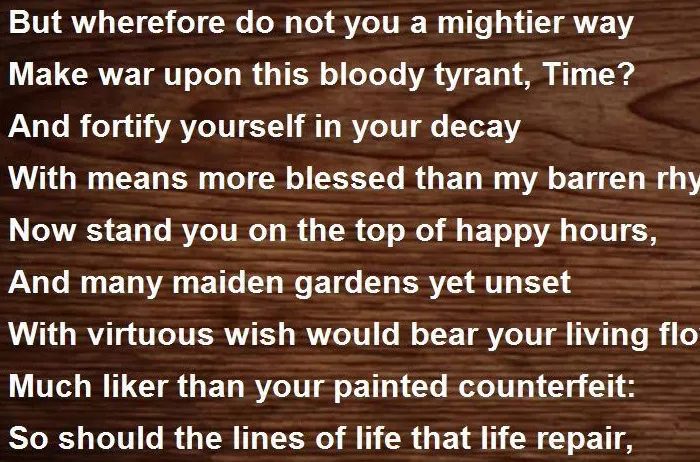William Shakespeare’s Sonnet 16 is a meditation on the passage of time and the limitations of poetry in preserving beauty and youth. It builds on themes of mortality and the struggle against the inevitable effects of time. Through a carefully structured 14-line verse, Shakespeare employs a logical progression of thought, urging the young man, to whom the sonnet is addressed, to take action to ensure his beauty and legacy endure beyond the ravages of time.
Shakespeare’s Sonnet 16
But wherefore do not you a mightier way
Make war upon this bloody tyrant Time,
And fortify yourself in your decay
With means more blessèd than my barren rhyme?
Now stand you on the top of happy hours,
And many maiden gardens, yet unset,
With virtuous wish would bear your living flowers,
Much liker than your painted counterfeit.
So should the lines of life that life repair
Which this time’s pencil or my pupil pen
Neither in inward worth nor outward fair
Can make you live yourself in eyes of men.
To give away yourself keeps yourself still,
And you must live, drawn by your own sweet skill.
The Structure and Tone of Sonnet 16
Shakespeare’s Sonnet 16 follows the conventional structure of the English sonnet: 14 lines in iambic pentameter, divided into three quatrains (four-line stanzas) and a final rhymed couplet. This structured form allows for a clear development of argument, culminating in a resolution or exhortation in the final two lines.
The tone of the sonnet is both critical and imploring. Shakespeare expresses frustration with the young man’s failure to act on the advice given in earlier sonnets, yet he also urges him to recognize his own agency in confronting the destructive force of time. There is a sense of urgency as the speaker highlights the futility of relying solely on poetry as a means of preservation.
Analysis of Sonnet 16
Lines 1–4
“But wherefore do not you a mightier way
Make war upon this bloody tyrant Time,
And fortify yourself in your decay
With means more blessèd than my barren rhyme?”
In the opening quatrain, Shakespeare begins by questioning why the young man does not take more decisive action against the inevitable decay caused by time. The phrase “bloody tyrant Time” personifies time as a ruthless force, emphasizing its destructive power. The speaker suggests that the young man should “fortify yourself in your decay” by seeking ways to preserve his youth and beauty beyond the superficial means that poetry provides. The mention of “barren rhyme” refers to the poet‘s own inability to fully protect or preserve the young man’s beauty, indicating that mere verse is insufficient against the ravages of time.
Lines 5–8
“Now stand you on the top of happy hours,
And many maiden gardens, yet unset,
With virtuous wish would bear your living flowers,
Much liker than your painted counterfeit.”
In the second quatrain, Shakespeare acknowledges that the young man is currently at the peak of his life (“on the top of happy hours”) and still has the potential to create a legacy. The metaphor of “maiden gardens” represents untouched potential, while “living flowers” symbolizes the young man’s future offspring—children who could carry on his beauty and virtues. Shakespeare contrasts this with the idea of “painted counterfeit,” referring to the idealized but ultimately false image of the young man’s beauty that poetry or art might create. The suggestion here is that real progeny—offspring—would preserve the young man’s true beauty and essence more effectively than the poet’s work.
Lines 9–12
“So should the lines of life that life repair
Which this time’s pencil or my pupil pen
Neither in inward worth nor outward fair
Can make you live yourself in eyes of men.”
Here, Shakespeare argues that true preservation of beauty and life lies in the creation of descendants, who can carry on the “lines of life” and repair the damage inflicted by time. Both the “time’s pencil” (a metaphor for time’s effects) and the “pupil pen” (referring to the poet’s own writing) are incapable of preserving the young man in a meaningful way, whether in terms of “inward worth” (character) or “outward fair” (physical beauty). The poet acknowledges that, although poetry can celebrate beauty, it cannot reverse the passage of time or make someone immortal.
Lines 13–14
“To give away yourself keeps yourself still,
And you must live, drawn by your own sweet skill.”
In the final couplet, Shakespeare concludes with a paradox: by giving of himself, the young man can ensure his own immortality. The phrase “give away yourself” suggests that by fathering children, the young man can preserve his essence through future generations. This act of self-replication is presented as a form of true survival, one that transcends the limits of both time and art. “Sweet skill” refers to the young man’s own ability to procreate, which is ultimately the way to keep his legacy alive.
Conclusion
Shakespeare’s Sonnet 16 is a profound reflection on the nature of time, beauty, and the role of poetry in preserving both. It stresses the limits of poetic art in preserving the human form and suggests that the creation of life—through children—is the most effective way to combat time’s destructive influence. The sonnet’s logical structure reinforces this argument, moving from a critique of the inadequacy of poetry to a solution that lies in human agency. The tone shifts from frustration to urging, as Shakespeare implores the young man to take action, ensuring that his beauty and legacy will endure long after the passage of time.

